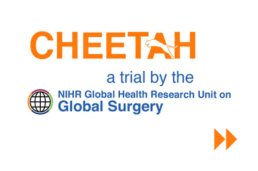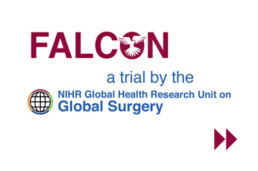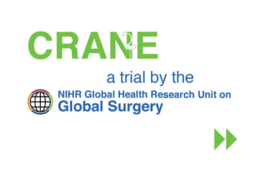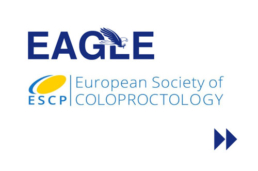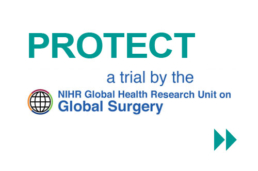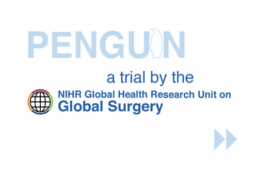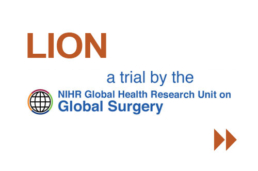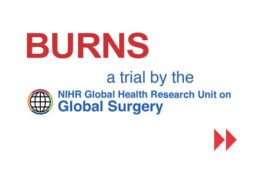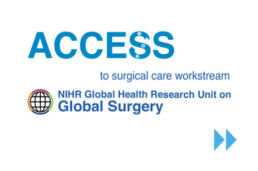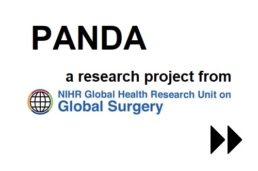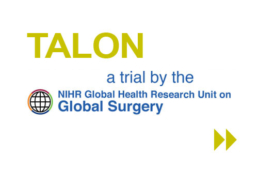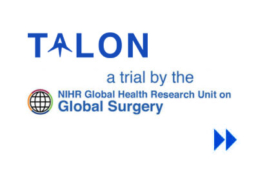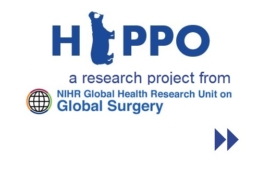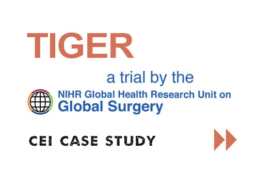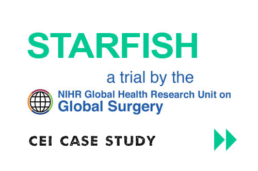Project MAGPIES
The MAGPIES Study
MAGPIES will calculate the global surgery case-mix stratified by body region, age and urgency of surgery. This will be the first study collecting data directed to achieve this and will allow future modelling studies relevant to inform specific needs in each country.
Improving surgical outcomes through collaborative research
The MAGPIES Study – Mapping Global Surgery.
- Surgical volume is one of the Lancet Commission on Global Surgery indicators to measure access to surgery.
- Previous studies have estimated the overall surgical volume in each country, but case mix is not known.
- Breakdown of procedures by patient age, surgical specialty, and urgency of surgery is essential to map surgery being provided to population needs .
- Best previous estimate from ‘surgical outcomes studies’, where data is 10 years old, there is limited granularity and by performing a secondary analysis, there are methodological limitations.
- Global surgical case-mix can be used to inform future global modelling studies: unmet need for cancer surgery, postoperative mortality, catastrophic health expenditure on surgery and global workforce planning.
The aim of this study is to estimate the global surgery case mix with sufficient granularity to determine the number of operations completed in each country stratified by patient age, surgical specialty, and urgency of surgery.
- MAGPIES will aggregate administrative data relating to surgical volume. All hospitals from all countries are eligible to take part.
- Disseminated via contacts from the National Institute for Health and Care Research (NIHR) Global Surgery unit.
- Number of ALL operations during 14 consecutive days, between 15th January – 28th February 2024.
- Data collection will be stratified by age (adults versus children), five broad body regions (cardio-vascular- thoracic, general, musculoskeletal, and skin, head and neck and obstetrics), and urgency of surgery (elective, emergency).
For hospitals with 30 or fewer operating rooms, the team will have up to a maximum of 3 collaborators plus the hospital lead. For hospitals with more than 30 operating rooms, one more member can be added per each 10 operating rooms.
Check here if your hospital already has a hospital lead in place, contact them if you want to join the study.
If your hospital does not have a hospital lead, you can list yourself to be one, follow this link and fill the form please.
- Both day case surgeries and inpatient surgeries are included.
- Eligible procedures performed with and without general anaesthetic are included.
- Endoscopic procedures (diagnostic or therapeutic) that are usually performed in an operating theatre by a surgeon are included.
- Interventional radiology procedures are excluded.
- Endoscopic procedures that are usually performed outside of an operating theatre (e.g. in an endoscopy suite) or by a non-surgeon are excluded.
- Minor procedures listed here should not be counted.
Study Protocol, please click here
Case Report Form (CRF) in Excel, to download, click here
Inclusion and Exclusion criteria, click here
Supporting letter, click here
Ethics approval from University of Birmingham, click here
Visual Abstract, click here
Documents in French:
Protocol click here.
Inclusion and Exclusion click here.
Data Collection click here.
Documents in Spanish
Protocol – click here
If you have any questions, please email magpies.gsu@gmail.com
Q: How can a hospital take part in MAGPIE?
To participate in the study, a hospital lead must be appointed.
First, to join the study, check if your hospital has an appointed lead. If there is not one, and you are part of a local surgical or anaesthetic team led by a resident or consultant, you can register as the hospital lead. To do so, visit https://redcap.link/magpies_leads and complete the registration. Once registered, you can add collaborators from your hospital to the team based on the number of operating theatres and the size of your facility.
Q: When does data collection start?
The data collection for the study is a 14-day continuous period chosen by each participating hospital. This period falls within the overall study window, from 15 January 2024 to 28 February 2024. Each hospital team can select 14 consecutive days within this timeframe to collect data. This flexibility allows hospitals to choose a period that best fits their operational schedule while ensuring consistency across the study. The deadline to upload data will be 15th March 2024.
Q: Are Colonoscopies and Endoscopies Included in the study?
No, colonoscopies and endoscopies are not included in the data collection for the Global Surgery Case Mix study. The study focuses on operations performed by a surgeon in an operating theatre. Minor procedures, such as colonoscopies and endoscopies, are typically excluded, as detailed in the study’s protocol (please refer to the protocol for the list of included and excluded procedures).
Q: What is Included in each Body Region for the MAGPIE Study?
Each body region includes group of systems as outlined in the study protocol. For a detailed list of procedures excluded under each body region, please refer to Appendix 2 of the study protocol.
Q: How to Enter Data?
Hospital leads will receive a specific link to a RedCap survey where they can enter the required data. The data should be filled in as per the categories provided in the attached table, which includes:
Number of operations performed, divided by age group (adults aged 18+ and children aged 0-17).
Classification by type of surgery (Elective or Emergency).
Distribution across different surgical specialties such as Head and Neck, Cardiovascular and Thoracic, General surgery, Musculo-skeletal and Skin, and Obstetrics.
Q: How will we have access to the RedCap link to enter the data collected?
A specific RedCap link will be provided to the hospital lead to enter the data collected. Collaborators can collect the data on paper during their respective data collection period, after which the hospital lead will be responsible for entering it into the system using the provided RedCap link. This ensures a centralized and organized data entry process. The excel spreadsheet available in the website is also helpful to sum all the operations that were counted for each day.
Q: What Should Be Done Regarding Ongoing Surgeries in the First and Last Minutes of Data Collection?
We recommend to count surgeries where ‘knife to skin’ / time of beginning of operation is during the 14 day period selected. Therefore any ongoing operations at midnight of day 1, should NOT be counted, because they started before 00:00. The same applies to the last day of data collection, if an operation started before 23:59 on day 14, it should be included and counted, even if it ends after day 14.
Q: Should We Collect Data on All Surgeries or Just Those Performed by Our Team?
All surgeries performed in the hospital should be collected to ensure data completeness and to avoid selection bias. It is essential to capture every surgical procedure within the data collection period, regardless of which team performs the surgery.
Q: How Many Forms Need to Be Entered for the Global Surgery Case Mix Study?
Each hospital must enter only one form covering the selected 14-day data collection period. To maintain the integrity of the study and avoid duplication, we will not accept more than one form from any hospital. Exceptions to this need to be agreed with the study team beforehand.
Q: What is the Maximum Number of Team Members Allowed in the Study?
The maximum number of team members allowed to participate in the study from each hospital depends on the number of operating rooms covered during the data collection period. Here is the breakdown:
For hospitals with 1-30 operating rooms: one hospital lead and up to 3 collaborators.
For hospitals with 31-40 operating rooms: one hospital lead and up to 4 collaborators.
For hospitals with 41-50 operating rooms: one hospital lead and up to 5 collaborators.
For hospitals with 51-60 operating rooms: one hospital lead and up to 6 collaborators.
For hospitals with 61-70 operating rooms: one hospital lead and up to 7 collaborators.
For hospitals with 71-80 operating rooms: one hospital lead and up to 8 collaborators.
Q: How Will Authorship Be Recognised?
Authorship will be recognized following the National Research Collaborative Authorship guidelines. Research outputs from the study will be listed under the single corporate authorship of NIHR Global Surgery Unit (Examples: https://pubmed.ncbi.nlm.nih.gov/33485461/). All collaborators and hospital leads will be credited as PubMed-citable collaborators based on their roles fulfilled in the study.
The hospital lead is responsible for collecting and providing all participants’ email addresses and ORCID iDs to compile the list for group authorship. The hospital lead must ensure the accuracy of this information, as it is necessary for proper recognition in the study’s publications.
Q: When Does Data Entry Need to Be Completed?
All data entry for the Global Surgery Case Mix Study must be completed by 15th March 2024. It is important for hospital leads to adhere to this deadline to ensure that all collected data is accounted for in the study’s final analysis.
Q: What is the approval file you asked us to upload?
Data should not be collected or uploaded until you have approval from the relevant authority. If you have provisional permission to collect data that is acceptable and you can upload evidence of this. If you have been advised that specific local approval is not needed for this project because it is very low risk or because it has UK approval then that is also OK and you can upload evidence of this. However if you have not had any type of approval to collect and/or submit data then you should not submit – that’s to protect both you and the study.
Project Dragon
The DRAGON Study
Multicentre non-inferiority cluster randomised trial testing Disposable versus Reusable drApes and Gowns for green OperatiNg theatres.
Improving surgical outcomes through collaborative research
DRAGON TRIAL SUMMARY
Title: Multicentre non-inferiority cluster randomised trial testing Disposable versus Reusable drApes and Gowns for green OperatiNg theatres.
Background: The World Health Organisation makes no recommendation for the use of disposable or reusable surgical drapes and gowns due to a lack of effectiveness evidence. Since disposable versions are likely to have higher financial and carbon costs, they are only justifiable if they can be proven to significantly reduce surgical site infections (SSIs).
Aim: This randomised controlled trial will assess whether reusable surgical drapes and gowns are non- inferior in reducing SSI compared to disposable drapes and gowns in patients undergoing surgery.
Design: Pragmatic 1:1 international multi-centre non-inferiority cluster randomised controlled trial, with an internal pilot. Clusters are individual hospitals.
Eligibility:
- Clusters: Hospitals where there is clinical and organisational equipoise to randomise between disposable and reusable drapes and
- Participants: Patients (adults and children) undergoing surgery with incision of at least ≥5cm in adults and ≥3cm in children aged under 16 years, with a clean-contaminated or contaminated/dirty wound. Participants undergoing emergency or elective, and open or minimally invasive surgery are eligible.
Intervention: Reusable surgical drapes and gowns.
Comparator: Disposable (single-use) surgical drapes and gowns.
Primary outcome: The primary outcome is surgical site infection (SSI) within 30 days after surgery, evaluated based on US Centre for Disease Control criteria.
Sample size: The control group SSI event rate is estimated to be 12.5% based on previous literature. To determine whether reusable drapes and gowns are non-inferior to disposable drapes and gowns with a non-inferiority margin of 2.5% would require a total of 26,800 participants from 134 clusters, with an average of 200 participants per cluster, assuming 90% power, 2.5% one-sided alpha, intraclass correlation of 0.01 and 5% participant loss to follow up.
DRAGON Lay Summary
Can we make operations in the NHS more environmentally sustainable?
What is the rationale behind our study?
Operating theatres are a significant source of a hospital’s carbon emissions, accounting for at least 25% of the total. Carbon emissions refer to the release of carbon dioxide and other greenhouse gases into the atmosphere due to various activities. These gases trap heat in our planet’s atmosphere, causing it to warm up and leading to serious changes in climate which can lead to catastrophic events like flooding and heat waves. In operating theatres, a substantial portion of these emissions results from the use of anaesthesia gases. However, even the solid waste generated in operating theatres also contributes to carbon emissions.
What do we want to do?
We want to find out if there are ways of lowering NHS Trust operating theatres’ carbon output without compromising patient safety. Specifically, we want to compare the impact of using disposable (single use) surgical drapes and gowns with that of reusable ones, both of which are commonly used in the UK and worldwide, in terms of reducing surgical infections. Disposable drapes and gowns are known to have a higher carbon footprint compared to reusable ones. However, there is currently a lack of strong evidence or guidance available to help clinicians determine the best option.
How will we achieve this?
We will run a trial that aims to prove that reusable surgical drapes and gowns are just as good as disposable ones at preventing surgical infections. We will also look at the carbon footprint and cost of using each in different NHS Trusts. Since implementing a change in the type of surgical drapes and gowns used involves making system-wide changes within the hospital, requiring cooperation from multiple departments, we will conduct a cluster randomized trial. In this trial, individual patient consent will not be sought; instead, blanket consent will be obtained from the participating NHS Trusts on behalf of the patients who will undergo surgery while the trial is ongoing.
Who are we?
We are a multidisciplinary group of surgeons, anaesthetists, public health professionals, sustainability experts, implementation scientists and community engagement specialists based at the University of Birmingham, Queen Elizabeth Hospital and Queen Mary University London who want to make the delivery of care in the NHS environmentally sustainable.
Key documents
- Protocol: available shortly
- Patient information sheet: available shortly
Project Wolverine
The WOLVERINE Study
Wound closure and SSI prevention in abdominal surgery with long term follow-up
Improving surgical outcomes through collaborative research
Register for WOLVERINE here
*Period 1 recruitment has now closed. The start date of the period 2 audit/cohort has been delayed awaiting U.K. ethical approval. Further information will be sent in due course*
Key dates:
- First audit recruitment window runs from 1st November 2023 – 15th December 2023 (choose your own start date from within these dates).
- All participating centres must recruit for at least 4 weeks and include minimum 10 consecutive eligible patients.
- Second audit AND cohort study recruitment window will open on 02nd January 2024
- Participating sites must have started recruitment by the 01st March 2024.
Database will be locked on the 30th April 2024 for clinician reported outcomes.
Background: The 2021 ESCP Wound Closure Survey found significant heterogeneity in common practices for abdominal wound closure and SSI prevention, including various types of fascial closure techniques and suture used, skin preparation and sterility measures taken during the surgical intervention.
Aim: To conduct a prospective, international audit and a cohort study in wound closure and SSI prevention following abdominal surgery. An international network will collate information on wound closure practices used and, within the cohort study element only, patients will provide their own short and longer-term outcomes on wound healing, recovery and return to normal function.
The data will also be used to inform the design of a future interventional trial on wound closure and SSI prevention.
Design: The study has two separate components:
- Prospective audit study: clinician-derived baseline clinical data and short-term 30-day outcomes for patients undergoing elective and/or emergency general and colorectal surgery.
- Cohort study: patient-reported additional outcome data for the period from 30 days to one year after surgery in the identical cohort of patients, provided that patient level informed consent is obtained.*
* All sites have the option to participate in either the audit alone or the combined audit and cohort study.
Centre eligibility: Any hospital or surgical unit performing elective and/or emergency general and colorectal surgery.
Patient eligibility: Adults (age 18 years and above) undergoing surgery by abdominal approach are eligible, including elective, expedited or emergency surgery by open, laparoscopic or robotic approaches with a minimum (extraction) incision length of 5 cm.
Key outcome measures:
Audit study: Patient, disease and operation-related factors including detailed information on wound closure techniques and SSI prevention measures.
Clinician-derived surgical outcomes data for up to 30 days post-operation
Cohort study: Additional patient-reported outcomes data at five time points: 30, 60 & 90 days, 6- & 12-months post-operation. Time-specific data collected on wound healing, post-operative recovery and return to normal activities, re-admissions and re-operations, development of incisional hernia at one year.
Key documents
- Audit Protocol: click here
- Patient information sheet: click here.
- Cohort Study Protocol: awaiting sponsor approval
55
COUNTRIES
243
HOSPITALS
1214
PATIENTS ENTERED
Programme Leap SAVE: Surgery: assess, validate, expand
Wellcome Leap SAVE
We are pleased to be contributing to this programme which focuses on accelerating laprascopic skills acquisition and enhancing postoperative monitoring through technology.
Improving surgical outcomes through collaborative research
The creation and deployment of complex interventions in surgery is challenging – not only are technological innovations frequently complex in themselves, but they necessitate expertise and backing from a broad group of stakeholders and must be sufficiently flexible to meet needs across a
diverse range of healthcare settings.
The successful delivery of health technology programs necessitates the strong and early engagement of patients, practitioners, and policy makers, shifting the focus from a binary question of effectiveness, to whether interventions can be acceptable, implementable, cost-effective, scalable, and transportable across settings
Background
As the NIHR Global Surgical Unit, we are one of the largest and most diverse surgical networks worldwide. Our ambition is to provide an agile global platform for end-to-end demonstration and evaluation of solutions developed by other programme performers, utilising our multi-country partnership model with stakeholder co-design and in-country leadership. Our proposal addresses laparoscopic surgery simulation and postoperative deterioration alert systems across a diverse range of low-, middle-, and high-income countries.
In order to achieve this, the pipeline of work will be delivered via 7 activity areas as shown below:
- Co-design and optimisation of laparoscopic simulation and postoperative deterioration alert programs
- Piloting: Scalable laparoscopic simulation training and assessment centres
- Evaluation: Laparoscopic simulation training evaluation program in MDs and non-MDs
- Piloting: Postoperative deterioration alert systems training, integration, and testing centres
- Evaluation: Postoperative deterioration alert system program evaluation
- Health system outcomes
- Project management
Aims & Objectives
Primary Objective
To provide an agile global platform for end-to-end demonstration and evaluation of programme-developed laparoscopic simulation and postoperative monitoring solutions to ensure they are useful locally and scalable across contexts, utilizing our multi-country partnership model with stakeholder co-design and in-country leadership.
Aims
- Using stakeholder co-design to facilitate globally applicable technological development, evaluation, and implementation
- To establish globally scalable laparoscopic simulation training and assessment centres to demonstrate and validate an accelerated skills training programme including non-MD trainees
- To establish global implementation and testing sites to demonstrate and validate enhanced postoperative deterioration detection programmes
- To measure program impacts at health system levels including workforce, facilities, and patient-level metrics, utilizing our historic control datasets and contemporary cohort studies
Collaborating Countries
Wellcome Leap SAVE is an international programme being conducted in multiple NIHR funded countries. Click on the map below to see participating countries.
Project GECKO
The GECKO Study
Evaluating global variation and outcomes for one of the commonest surgical procedures performed.
Improving surgical outcomes through collaborative research



The GECKO Study (GlobalSurg-4) will be an international observational cohort study. The GlobalSurg Network collaborators will come together to collect contemporaneous data on the performance and outcomes of cholecystectomy.
Latest GECKO Study (GlobalSurg-4) Webinar
Please check out our new webinar series on data validation training and visions / update
- Cholecystectomy is amongst the commonest surgical procedures performed, treating patients for biliary pathologies such as biliary cholic and gallstone pancreatitis, in emergencies and elective admissions
- Laparoscopy has evolved biliary surgery across the world. Despite mitigating the perioperative mortality burden of open surgery, laparoscopy imposes different burdens on the healthcare system, such as readmissions and operative complications.
- Hence, there is a focus to improve patient satisfaction and reduce hospital costs
- However, establishing universally safe cholecystectomy is a complex process, dependent on multiple factors such as adequate training, hospital infrastructure and enhanced peri-operative patient care
- The Global Evaluation of Cholecystectomy Knowledge and Outcomes (GECKO) Study, aims to fill the gap in evidence on the variations of safe provision of laparoscopic gallbladder surgery internationally, including low- and middle-income countries
The primary aim is to define the global variation in compliance to pre-, intra-, and post-operative audit standards.
The secondary aims are to:
- Determine quality of safe provision of cholecystectomy
- Assess adverse events following cholecystectomy and their management
- Analyse rates and outcomes of unsuspected gallbladder cancers
- Evaluate the availability of cholecystectomy services and training
- Assess sustainable practice in laparoscopic cholecystectomy
- GECKO is a prospective, international, observational collaborative cohort study
- Disseminated via contacts from the National Institute for Health and Care Research (NIHR) Global Surgery unit, leading emergency general surgeons and specialist organisations
- Consecutive patients undergoing cholecystectomy, between 31st July – 19th November 2023, with follow-up at 30-day and one-year postoperatively
- Age: All adult patients (greater than or including 18 years of age)
- Procedure: Primary cholecystectomy, where this is the main procedure planned
- Approach: Any Open, laparoscopic, robotic approaches are eligible
- Urgency: Elective, delayed and emergency procedures
- Procedure: Cholecystectomy as a part of another surgical procedure e.g., Whipple’s, bariatric, anti-reflux, transplant
- Indication: Patients with Mirizzi syndrome
- Return to theatre: Any patient returning to theatre and requiring a cholecystectomy for whatever indication, should not be included
- Known gallbladder malignancy: Gallbladder cancer diagnosed pre-operatively
For the Study Protocol, please click here
For the Site Survey, click here
For the Data Dictionary, click here
For the Case Report Form (CRF), click here
For the Visual Abstract, click here
For the Participant Consent Form, click here
For the Participant Information Sheet, click here
For the REDCap Guide, click here
For the REDCap Guide for Data Collection, click here
For the HRA Audit Statement, click here
For the signed Caldicott approval doc, click here
For the CARMS Accepted Study doc, click here
For the GlobalSurg 4 Data Contributor Terms and Conditions, click here
GECKO Hospital Lead Pack, click here
For the Study Leads FAQ, click here
For all GECKO video related content, including recordings from previous webinars, click here.
GECKO Webinar 19 Jan 24 AM Webinar data validation training and visions / update, click here.
GECKO Webinar 19 Jan 24 PM Webinar data validation training and visions / update, click here.
- General Inquiries: gecko@globalsurg.org
Twitter page, click here
Translation and Country Specific Documents
For the GECKO Participant Information Sheet in Arabic, click here.
For the GECK Consent Form in Arabic, click here.
For the GECKO Participant Information Sheet in Azerbaijan, click here.
For the GECKO Participant Consent Form in Azerbaijan, click here.
For the GECKO Participant Information Sheet in Chinese, click here.
For the GECKO Participant Consent Form in Chinese, click here.
For the GECKO Participant Information Sheet & Consent Form in Croatian, click here.
For the GECKO Protocol in Croatian, click here.
For the GECKO Patient Consent Form in French, click here.
For the GECKO Participant Information Sheet in French, click here.
For the GECKO Protocol in French, click here.
For the GECKO Patient Consent Form in Greek, click here.
For the GECKO Participant Information Sheet in Greek, click here.
For the GECKO IRB Approval, click here.
For the GECKO Patient Consent Form in German, click here.
For the GECKO Participant Information Sheet in German, click here.
For the GECKO Protocol in German, click here.
For the GECKO Patient Consent Form in Bengali, click here.
For the GECKO Patient Information Sheet in Bengali, click here.
For the GECKO Patient Consent Form in Hindi, click here.
For the GECKO Patient Information Sheet in Hindi, click here.
For the GECKO Patient Consent Form in Kannada, click here.
For the GECKO Patient Information Sheet in Kannada, click here.
For the GECKO Patient Consent Form in Malayalam, click here.
For the GECKO Patient Information Sheet in Malayalam, click here.
For the GECKO Patient Consent Form in Marathi, click here.
For the GECKO Patient Information Sheet in Marathi, click here.
For the GECKO Patient Consent Form in Oriya, click here.
For the GECKO Patient Information Sheet in Oriya, click here.
For the GECKO Patient Consent Form in Punjabi, click here
For the GECKO Patient Information Sheet in Punjabi, click here.
For the GECKO Patient Consent Form in Tamil, click here.
For the GECKO Patient Information Sheet in Tamil, click here.
For the GECKO Patient Consent Form in Telugu, click here.
For the GECKO Patient Information Sheet in Telugu, click here.
For the GECKO Patient Consent Form in Urdu, click here.
For the GECKO Patient Information Sheet in Urdu, click here.
For the GECKO Patient Consent Form in Indonesian, click here.
For the GECKO Participant Information Sheet in Indonesian, click here.
For the GECKO Participant Information Sheet in Japanese, click here.
For the GECK Protocol in Japanese, click here.
For the GECKO Patient Consent Form in Norwegian, click here.
For the GECKO Participant Information Sheet in Norwegian, click here.
For the GECKO DTA Signed Pakistan, click here.
For the GECKO Patient Consent Form in Filipino, click here.
For the GECKO Participant Information Sheet in Filipino, click here.
Para o GECKO Consentimento Informado, clique aqui.
Para o GECKO Modelo de Carta para CE, clique aqui.
Para o GECKO Protocolo PT, clique aqui.
For the GECKO Patient Consent Form in Spanish, click here.
For the GECKO Participant Information Sheet in Spanish, click here.
For the GECKO Protocol in Spanish, click here.
For the GECKO Presentation in Spanish, click here.
For the GECKO CRF in Spanish, click here.
For the GECKO HOJA Información in Spanish, click here.
For the GECKO Particpant Consent Form in Spanish, click here.
For the GECKO Patient Consent Form in Turkish, click here.
For the GECKO Participant Information Sheet in Turkish, click here.
For the GECKO Protocol in Turkish, click here.
For the GECKO Participant Information Sheet in Vietnamese, click here.
For the GECKO Participant Consent Form in Vietnamese, click here.
For the GECKO Protocol in Vietnamese, click here.
For the GECKO CRF in Vietnamese, click here.
For the GECKO Data Dictionary in Vietnamese, click here.
For the GECKO Participant Information Sheet in Russian, click here.
For the GECKO Participant Consent Form in Russian, click here.
For the GECKO Protocol in Russian, click here.
Ethical Approvals by Country
For the GECKO Ethical Approval for Australia, click here.
For the GECKO Ethical Approval for Dominican Republic, click here.
For the GECKO Ethical Approval for France, click here.
For the Ethical Approval for Ghana, click here.
For the GECKO Ethical Approval for Kazakhstan, click here.
For the GECKO Ethical Approval for Nigeria, click here.
For the GECKO Ethical Approval for Spain, click here.
Project PROTECT-Surg
The PROTECT-Surg Trial
The adaptive platform trial designed to assess interventions that will prevent complications from post-operative post-operative pneumonia.
Improving surgical outcomes through collaborative research


PROTECT-Surg is an adaptive platform design. Trial data will be reviewed on a regular basis to assess whether the the randomised comparisons in the study have provided evidence on postoperative pulmonary complications that is strong enough to influence global treatment guidelines.
Trial arms will be amended and new treatments that may show promise will also be considered on an ongoing basis and tested as part of the trial.
2
COUNTRIES
11
ACTIVE HOSPITALS
243
PATIENTS RECRUITED
Background
Surgical patients represent a highly vulnerable patient group, who are at particular risk of pneumonia during recovery from their operation.. They are vulnerable due to their underlying comorbidity, the physiological insult of an operation, and because they are subjected to invasive mechanical ventilation under anaesthesia. Whilst many non-urgent, non-cancer surgeries were delayed during the pandemic, many cancers, expedited and emergency surgeries continued to be performed. This patient risk continues into the post-pandemic era. Postoperative pneumonias are likely to create steep increases in mortality, morbidity, and resource use.
The PROTECT-Surg platform is designed to assess interventions that will prevent complications from post-operative pneumonia.
This trial seeks to investigate the prevention of perioperative pneumonia, an important and frequent surgical complication. This adaptive platform design seeks to identify at the earliest opportunity intervention arms which are showing benefit, drop arms which have a clear lack of benefit, and rapidly introduce new therapeutic options. This may include adoption of novel therapeutic agents or vaccinations as prophylaxis for surgical patients at risk of exposure.
An adaptive trial design will allow us to actively consider further trial interventions as they become available. These may be new therapies with early safety data. We are currently investigating, with other collaborators, candidate agents which are showing potential and will become available for testing on our platform. Due to the pace that this trial will progress, the control arm will remain the same throughout the duration of the study.
As diagnostic tests develop, this approach can also allow cohort enrichment and more accurate risk stratification once these diagnostic pathways are established; for example, to allow genetic stratification to target highest risk patients for specific treatments.
Aims & Objectives
Primary Objective
To provide reliable estimates of the effect of study treatments on postoperative pulmonary complications.
Secondary Objective
To assess the effects of study treatments on:
- Pulmonary function in keeping with WHO Solidarity Trial outcome scale
- Duration of intensive care and total hospital stay
- Safety and tolerability of study interventions
Surgical patients represent a highly vulnerable patient group, who are at particular risk of pneumonia during recovery from their operation.. They are vulnerable due to their underlying comorbidity, the physiological insult of an operation, and because they are subjected to invasive mechanical ventilation under anaesthesia. Whilst many non-urgent, non-cancer surgeries were delayed during the pandemic, many cancers, expedited and emergency surgeries continued to be performed. This patient risk continues into the post-pandemic era. Postoperative pneumonias are likely to create steep increases in mortality, morbidity, and resource use[2].
The PROTECT-Surg platform is designed to assess interventions that will prevent complications from post-operative pneumonia.
The aim of this study is to reduce pulmonary complications in patients undergoing abdominal or thoracic surgery in COVID-19 exposed hospital environments.
This trial has an adaptive platform design to identify at the earliest opportunity intervention arms which are showing benefit, drop arms which have a clear lack of benefit, and rapidly introduce new therapeutic options to the platform. This will enable rapid feedback of results to clinicians, allowing the standard of care to be modified as the pandemic progresses. Regular and frequent monitoring of results will be guided by an experienced, independent DMC.
Eligible patients will be randomised at the level of the individual in a 1:1 ratio between:
- Control (normal practice)
- RESP301 6ml mixture of 150mM sodium nitrate, 50mM mannitol and 100mM citric acid, buffered at pH 5.4, three times per day (at least 4 hours apart), for 7 days or until discharge, whichever occurs first
Patient Identification
Each participating hospital will decide how best to identify potentially eligible participants. Participant eligibility must be confirmed by an investigator prior to randomisation.
Recruitment – Consent
Researchers in each participating hospital, with advice from their research ethics committee(s), will decide how best to provide information to potential participants about the trial and seek informed consent (e.g. verbal or written informed consent, duration from receiving patient information sheet to participant providing informed consent, etc.). Patients should give separate consent for trial participation in addition to consent for the surgery itself; informed consent must be obtained prior to trial randomisation. Assumed consent in emergency settings is not possible because of the inhaled nature of the IMP.
Randomisation
Once informed consent for trial participation has been obtained, baseline data will be collected on the Randomisation Form. This should be completed by either the person taking consent or a member of the research team (e.g. nurse, clinical officer, medical officer).
Patients will be randomised on the day of surgery via a secure online randomisation system (available at: https://bctu-redcap.bham.ac.uk/). Patients will be randomised at a ratio of 1:1 and the online randomisation system will include a minimisation algorithm to ensure balance in the treatment. Minimisation variables are designed to be readily available and easy to determine:
• Site
• Age (<70 years versus 70+ years)
• Timing of surgery (elective versus emergency)
Treatment
Arm 1: Control (normal practice)
Treatment without the trial intervention. Patients will be treated as per hospital routine practice. The control arm may change over the course of the trial and will be monitored by the TMG and DMC.
Arm 2: RESP301
RESP301 is a formulation consisting of three agents already used in clinical practice: mannitol, sodium nitrite and citric acid. Delivered by a vibrating mesh nebuliser three times per day (TID) (at least 4 hours apart), for 7 days. Each dose of RESP301 is a 6ml admixture of 150mM NaNO2, 50mM mannitol and 100mM citric acid, buffered at pH 5.4.
RESP301 is administered quickly (8-10 minutes) via an easy-to-use, vibrating mesh nebuliser. The recommended nebulisers used to administer this intervention are available in all participating countries. The intervention will be administered using a nebuliser according to standard local practice; where permitted for patients to self-administer, a member of the clinical team will ensure that the patient has viewed the intervention administration training video, and will also oversee the patient for the first trial dose to ensure proper administration.
Hand-held vibrating mesh nebulisers with regulatory approval for use in each designated country will be used for this trial. Chosen products will meet specifications to ensure delivery of the intervention at the protocol-mandated dose. The details of each of the country specific nebulisers will be provided in a separate appendix.
Patients should undergo perioperative care according to each hospital’s normal practice, the main factors of which will be recorded. Potential interactions will be checked on a case by case basis. Discontinuation rates will be monitored.
Patients are eligible for the study if all of the following apply:
- Patients aged 18 years and over.
- Planned to undergo abdominal or thoracic elective or emergency inpatient surgery requiring general anaesthesia.
- Patient consent.
- Able to operate a vibrating mesh nebuliser, as assessed by the recruiting physician.
The eligibility criteria may change over time to reflect new diagnostic tests or changing epidemiology. This will be reviewed regularly by the TSC and DMC. For example, if routine serological screening before surgery becomes feasible during the course of the trial in any participating hospital, only seronegative patients may be eligible for the trial.
Co-enrolment into other interventional trials may be considered on a case-by-case basis, and must be agreed with the study CI prior to randomisation into PROTECT- Surg.
Patients are not eligible for the study if any of the following apply:
- Procedures under local anaesthesia
- Known history of adverse reaction/contraindication to trial drug.
- Pregnancy and/or lactating patients (including patients undergoing caesarean section).
- History of methaemoglobinaemia
- Patients receiving any type of prescribed nitric oxide-donating agents (e.g.Nitroprusside, Isosorbide dinitrate, Isosorbide mononitrate, Naproxcinod, Molsidomine and Linsidomine)
- Unable to tolerate use of a nebuliser.
Sponsor and central coordination (BCTU)
The University of Birmingham will act as the Sponsor in all collaborating countries. Birmingham Clinical Trials Unit (BCTU) is the International Coordinating Centre (ICC) for PROTECT-Surg.
BCTU is responsible for overall coordination of the trial, including, but not limited to: procuring requisite ethics and regulatory approvals; organising meetings of oversight committees (TMG, DMC, TSC); development of trial database, SOPs, trial-specific documentation and provision thereof to participating hospitals; monitoring and reporting trial progress and safety (including onward safety reporting) in line with applicable regulatory requirements.
Participating Hospital sites
At each hospital site, a Principal Investigator (PI) and their team will: obtain requisite regulatory and ethical permissions to run the trial; ensure all relevant staff have received mandatory trial training; respond to queries from participants, the public and BCTU; and conduct trial procedures in accordance with the protocol and local policy.
Trial Management Group (TMG)
The TMG includes those individuals responsible for the day-to-day management of the trial. This will include the trial CI, lead methodologists, statisticians and trial management staff. The role of the TMG is to monitor all aspects of the conduct and progress of the trial, ensure that the protocol is adhered to and take appropriate action to safeguard participants and the quality of the trial.
Data Monitoring Committee (DMC)
The DMC will operate in accordance with a trial-specific charter. The DMC will review unblinded interim analyses according to a schedule described in the aforementioned charter and make recommendations to the TSC regarding possible amendments to the protocol (for example, if any of the treatment arms may require discontinuation or adjustment, or in the event of any safety concerns).
Trial Steering Committee (TSC)
The TSC will provide overall supervision of the trial to ensure that it is being conducted in accordance with the principles of Good Clinical Practice and other relevant regulations. The TSC will operate in accordance with a trial-specific charter. The specific tasks of the TSC are:
- Review and approval of the trial protocol and amendments, new sub study proposals and publications
- Review trial progress (including review of emerging information that be of relevance to the trial, e.g. new studies, therapies, etc) and advise on issues raised by other oversight committees
- Review recommendations from the DMC and help with subsequent decision-making
Scientific Advisory Committee (SAC)
The SAC will provide expertise scientific guidance and advice on the strategic direction of the trial. The specific tasks of the SAC are to:
- Provide advice based predominantly on research evidence from the natural or social sciences
- Provide constructive feedback about the scientific direction of the trial and help with subsequent decision-making
- Sharing ideas, based on data and professional experience.
Central Trial Management Group (University of Birmingham)
PROTECTSurg Trial Team
Birmingham Clinical Trials Unit, Public Health Building
University of Birmingham, Edgbaston, B15 2TT
Email: PROTECT-Surg@trials.bham.ac.uk
Tel: from UK 0121 415 9103, International +44121 415 9103
Twitter: @ProtectSurg
Project Hippo
HIPPO
Global Cohort Study: HernIas, Pathway and Planetary Outcomes for Inguinal Hernia Surgery. A multicentre prospective study with inguinal hernia patients.
Global Cohort Study: HernIas, Pathway and Planetary Outcomes for Inguinal Hernia Surgery. A multicentre prospective study with inguinal hernia patients.
Improving surgical outcomes through collaborative research


Hernias, Pathway and Planetary Outcomes for Inguinal Hernia Surgery
HIPPO is a global, prospective cohort study that started data collection on 30th January 2023.
Our aim is to:
- Characterise the global backlog for elective surgery
- Technique, training and operating surgeon variation
- Explore environmentally sustainable practices in operating theatres
Data collection started on 30th January and is currently in the 4th and last period. We have been chasing missing data and data inconsistencies so please read below how to check data from your centre.
Patients per country involved

Supporting documents
Please click here to check what you need to do to check data from your centre.
You can access the instruction video by clicking here.
You can access the authorship confirmation and hospital level survey information PDF by clicking here.
You can access the instruction video by clicking here.
You can access the study protocol by clicking here.
You can view the aims of the study video by clicking here.
Translations & Country specific documents
HIPPO contact forms - national leads
| Region | Country | First Name | Last Name |
| Europe | Albania | Irida | Dajti |
| Austria | Felix | Aigner | |
| Belgium | Frederik | Berrevoet | |
| Bosnia and Herzegovina | Samir | Delibegovic | |
| Bulgaria | Mihail | Slavchev | |
| Croatia | Jakov | Mihanovic | |
| Cyprus | Anneza | Yiallourou | |
| Nikolaos | Gouvas | ||
| Czech Republic | Barbora | East | |
| Ethiopia | Alazar | Berhe | |
| France | Alexis | Arnaud | |
| Georgia | Zaza | Demetrashvili | |
| Germany | Hans | Lederhuber | |
| Greece | Ioannis | Katsaros | |
| George | Tsoulfas | ||
| Ireland | Sinead | Ramjit | |
| Italy | Francesco | Pata | |
| Gaetano | Gallo | ||
| Lithuania | Aiste | Gulla | |
| Malta | Josephine | Psaila | |
| North Macedonia | Toni | Risteski | |
| Poland | Wiktor | Krawczyk | |
| Portugal | Mafalda | Alves | |
| Irene | Santos | ||
| Guilherme | Nobre | ||
| Romania | Ionut | Negoi | |
| Russian Federation | Aleksandr | Butyrskii | |
| Slovenia | Jurij | Kosir | |
| Spain | Ana | Minaya Bravo | |
| Sweden | Maziar | Nikberg | |
| Switzerland | Eleftherios | Gialamas | |
| Africa | Benin | Ismael | Lawani |
| Burkina Faso | Aimee Florence | Sanou | |
| Adama | Sanou | ||
| Burundi | Mbonicura | Jean Claude | |
| Alliance | Niyukuri | ||
| Cameroon | Olivier | Gabom | |
| Chukwuemeka | Nwegbu | ||
| Aristide | Bang | ||
| Egypt | Sameh | Emile | |
| Ethiopia | Alazar | Berhe | |
| Gabon | Natacha | Boumas | |
| Ghana | Eseenam | Abgeko | |
| Stephen | Tabiri | ||
| Kenya | Intisar | Hisham | |
| Liberia | Elvis | Mbanzabugabo | |
| Libya | Muhammed | Elhadi | |
| Madagascar | Luc | Samison | |
| Malawi | Raymond | Nyirenda | |
| Mulinda | Nyirenda | ||
| Mali | Bréhima | Bengaly | |
| Namibia | Rashid Nashidengo | Nashidengo | |
| Niger | Adakal | Ousseini | |
| Nigeria | Adesoji | Adewumiya | |
| Wale | Adisa | ||
| Rwanda | Faustin | Ntirenganya | |
| Sierra Leone | Ibrahim | Fortune | |
| South Africa | Rachel | Moore | |
| Kathryn | Chu | ||
| Sudan | Mohammed | Elmujtaba | |
| Tanzania | Mugisha | Nkoronko | |
| Uganda | Isaac | Mubezi | |
| Americas | Argentina | Martin | Lucchini |
| Manuel | Palacios | ||
| Canada | Amanpreet | Brar | |
| Janet | Martin | ||
| Chile | Maria Marta | Modolo | |
| Maricarmen | Olivos | ||
| Colombia | Jose Andres | Calvache | |
| Dominican Republic | Silvia | Batista | |
| Ruben | Rivas | ||
| Ecuador | Eddy | Lincargo | |
| Paraguay | Hugo | Gomez | |
| United States | Josh | Ngkamstra | |
| Venezuela | Osama | Bahsas Zaky | |
| China, SE Asia & Pacific | Australia | Amanda | Dawson |
| Elizabeth | Lun | ||
| Kristy | Atherton | ||
| Malaysia | April | Roslani | |
| New Zealand | Matt | McGuinness | |
| Debora | Wright | ||
| Philippines | Marie Dione | Parreno-Sacdalan | |
| Jose Macario | Faylona | ||
| Asia | India | Dhruva | Ghosh |
| Parvez | Haque | ||
| Atul | Suroy | ||
| Lovenish | Bains | ||
| Jyoti | Dhima | ||
| Israel | Gadi | Marom | |
| Jordan | Faris | Ayasra | |
| Kazakhstan | Ildar | R Fakhradiyev | |
| Ayesha | Iqbal | ||
| Oman | Bashar | Dawud | |
| Ali Al | Sharq | ||
| Zainab | Al-Balushi | ||
| Pakistan | Ahmad | Uzair Qureshi | |
| Palestine | Hamdoon | Abu-Arish | |
| Sri Lanka | Umesh | Jayarajah | |
| Dakshitha | Wickramasinghe, | ||
| Syria | Muhammad | Alshaar | |
| Turkey | Arda | Isik |
Bringing together surgeons, researchers and policy makers to set the local research agenda according to patient need in LMIC and ensuring all patients have the opportunity to take part in our research.
Nursing Network
The Surgical Nursing Network
Improving surgical outcomes through nursing initiatives


Outcome of surgery is not dependent solely on surgeons skills but on the completeness of the Surgical Nursing competence & compassionate care.
The global nursing workforce is made up of approximately 27.9 million men and women, accounting for almost 50% of the global health workforce.
Our goal is to strengthen the contribution of this skilled workforce in:
- Delivering optimum perioperative care to improve surgical outcomes for patients
- Building nursing research and research management capacity through education and training for nurses to facilitate collaborative work with existing GlobalSurg teams
- Building a global consensus on the nurse priorities for perioperative research
- Building capacity and capability to advance the perioperative nurse workforce with a focus on LMICs
- Working in collaboration with the Edinburgh Global Nursing Initiative | The University of Edinburgh https://www.ed.ac.uk/health/subject-areas/nursing-studies/global-initiative
For any associated queries, please contact Sangeetha Samuel (Project Co-Lead)
“We are currently assembling the information for this page which will be published soon. Thank you for your patience and please visit us again soon to see the update information.”
0
CONTINENTS
0
COUNTRIES
0
HOSPITALS
0
PATIENTS RECRUITED
Bringing together surgeons, researchers and policy makers to set the local research agenda according to patient need in LMIC and ensuring all patients have the opportunity to take part in our research.
Project Panda
The PANDA Study
Improving surgical outcomes through collaborative research


PANDA Overview
PANDA seeks to use qualitative methods to understand what matters to patients in their receipt of surgical care, to prioritise these themes, and explore differences across countries and contexts. Design and delivery of PANDA will be informed by patient and community representatives, with the explicit aim of growing networks for local community involvement in LMICs. Use of qualitative methodology to explore patients experiences of surgical treatment in depth in this study will have several advantages.
Firstly, it will allow deep conceptual understanding of patient’s priorities during their surgical care journeys. Whilst each patient will have their own unique care story, there are likely to be commonalities to patient experience which could underpin patient-centred design for large, multi-country research studies. Secondly, working with patients and community representatives to co-produce and prioritise themes will help improve capacity and leadership for CEI in low-resource settings. Thirdly, through talking to patients about research topics in depth we will improve ‘research literacy’ amongst local populations, and help to identify new patient partners for research involvement in global surgery.
Through co-production of the PANDA study between patients, community members and research team members in LMICs, the key principles of sharing power, building relationships, diverse perspectives, respect and reciprocity for successful CEI will be upheld.
Research exploring patients experiences of surgical care has predominantly focussed on the preoperative setting (i.e., access to care). Qualitative studies of the perioperative care pathway have focussed on providers resilience to resource shortfalls, system level factors impacting on care delivery, and preoperative optimisation checklists. Few studies have focussed on patient priorities for their surgical care, and none in LMICs. In a study with a similar methodology in Sweden (high income) four areas were highlighted including accessibility, reliability, caring attitudes and empowerment.
For patients undergoing head and neck cancer surgery in an Australian hospital (high-income), psychological support for ‘shocks and aftershocks’ was prioritised as a key research area. There is an urgent need to understand patients experiences and priorities for surgical care in LMICs to inform future research planning and design.
You can view further information on the study via the recently created PowerPoint presentation.
0
CONTINENTS
0
COUNTRIES
0
HOSPITALS
0
PATIENTS RECRUITED
PANDA Aims
- To explore and describe patients experience of perioperative care pathways in LMICs
- To identify and prioritise concepts and themes for research in global surgery with patients in LMICs
- To explore the feasibility of flexible, collaborative co-production of research between LMIC researchers, patients and UK researchers in global surgery.
- To build capacity for CEI through identifying, training and involving patients and community members in the PANDA study.
Key Documents
PANDA Protocol can be obtained here
PANDA Patient Consent form can be accessed here
PANDA Patient Information sheet can be accessed here
PANDA topic guide can be accessed here
Project Burns
The BURNS Study
Burns are a significant contributor to the burden of disease in low- and middle-income countries (LMIC).
Improving surgical outcomes through collaborative research


Burns are a significant contributor to the burden of disease in low- and middle-income countries (LMIC). Although current guidelines recommend treatment in specialized treatment centres, such centres are few or non-existent in many LMIC settings.
This study is a prospective observational study comparing outcomes of burns treatments between non-specialised and specialised burns units.
Led by Dr Chikwendu Ede and Dr Rachel Moore from the NIHR Global Surgery Unit hub in South Africa, this is a prospective observational study comparing outcomes of burns treatments between non-specialised and specialised burns units. Information on 90 day mortality will be collected over a 6 month period at up to 9 non-specialised hospitals treating adult burns patients and compared to outcomes for patients at a dedicated burns unit at Chris Hani Baragwanarth Academic Hospital in Soweto, Johannesburg.

“We are currently assembling the information for this page which will be published soon. Thank you for your patience and please visit us again soon to see the updated information.”

